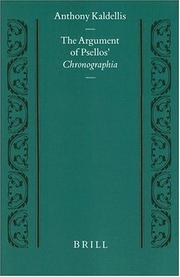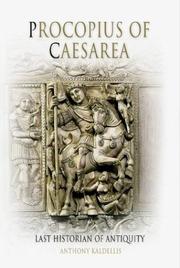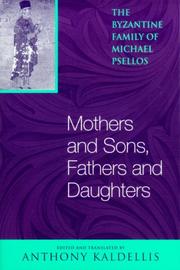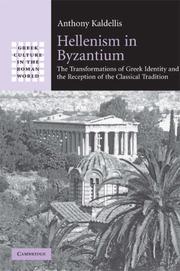| Listing 1 - 10 of 36 | << page >> |
Sort by
|

ISBN: 9004114947 9004452869 Year: 1999 Volume: 68 Publisher: Leiden ; Boston ; Köln Brill
Abstract | Keywords | Export | Availability | Bookmark
 Loading...
Loading...Choose an application
- Reference Manager
- EndNote
- RefWorks (Direct export to RefWorks)
Filosofie [Middeleeuwse ] --- Medieval philosophy --- Middeleeuwse filosofie --- Philosophie médiévale --- Philosophy [Medieval ] --- Philosophy, Medieval --- Psellus, Michael. --- Byzantine Empire --- Empire byzantin --- Civilization --- Historiography --- Civilisation --- Historiographie --- 930.21 MICHAEL PSELLUS --- Scholasticism --- Historiografie. Geschiedenis van de geschiedwetenschap--MICHAEL PSELLUS --- Psellus, Michael --- Psell, Mikhail --- Psellus, Constantinus --- Psello, Michele --- Psellos, Michaēl --- Psellus, Constantine --- Psellos, Michał --- Psel, Mikhail --- Psel, Mihailo --- Ψελλός, Μιχαὴλ --- Psellos, Mihail --- Psellos, Konstantine --- -Civilization --- Philosophy, Medieval. --- 930.21 MICHAEL PSELLUS Historiografie. Geschiedenis van de geschiedwetenschap--MICHAEL PSELLUS --- Philosophie médiévale --- Byzantium (Empire) --- Vizantii︠a︡ --- Bajo Imperio --- Bizancjum --- Byzantinē Autokratoria --- Vyzantinon Kratos --- Vyzantinē Autokratoria --- Impero bizantino --- Bizantia --- Historiography. --- Michael Psellus --- Psellos, Michel

ISBN: 0812237870 9786613211767 1283211769 0812202414 Year: 2004 Publisher: Philadelphia : ©2004 University of Pennsylvania Press,
Abstract | Keywords | Export | Availability | Bookmark
 Loading...
Loading...Choose an application
- Reference Manager
- EndNote
- RefWorks (Direct export to RefWorks)
Justinian governed the Roman empire for more than thirty-eight years, and the events of his reign were recorded by Procopius of Caesarea, secretary of the general Belisarius. Yet, significantly, Procopius composed a history, a panegyric, as well as a satire of his own times. Anthony Kaldellis here offers a new interpretation of these writings of Procopius, situating him as a major source for the sixth century and one of the great historians of antiquity and Byzantium.Breaking from the scholarly tradition that views classicism as an affected imitation that distorted history, Kaldellis argues that Procopius was a careful student of the classics who displayed remarkable literary skill in adapting his models to the purposes of his own narratives. Classicism was a matter of structure and meaning, not just vocabulary. Through allusions Procopius revealed truths that could not be spoken openly; through anecdotes he exposed the broad themes that governed the history of his age.Elucidating the political thought of Procopius in light of classical historiography and political theory, Kaldellis argues that he owed little to Christianity, finding instead that he rejected the belief in providence and asserted the supremacy of chance. By deliberately alluding to Plato's discussions of tyranny, Procopius developed an artful strategy of intertextuality that enabled him to comment on contemporary individuals and events. Kaldellis also uncovers links between Procopius and the philosophical dissidents of the reign of Justinian. This dimension of his writing implies that his work is worthy of esteem not only for the accuracy of its reporting but also for its cultural polemic, political dissidence, and philosophical sophistication.Procopius of Caesarea has wide implications for the way we should read ancient historians. Its conclusions also suggest that the world of Justinian was far from monolithically Christian. Major writers of that time believed that classical texts were still the best guides for understanding history, even in the rapidly changing world of late antiquity.
Procopius. --- Prokopiĭ, --- Procope, --- Prokopios, --- Prokop, --- Procopius, --- Prokopi, --- Procopio --- HISTORY / Ancient / Rome. --- Procopius --- Procope --- Procopius Caesariensis --- Procope de Césarée --- Prokopios --- HISTORY --- Ancient Studies. --- Autobiography. --- Biography. --- Classics. --- History.
Book
ISBN: 9780812245318 0812245318 1322512795 0812208404 Year: 2013 Volume: *3 Publisher: Philadelphia : University of Pennsylvania Press,
Abstract | Keywords | Export | Availability | Bookmark
 Loading...
Loading...Choose an application
- Reference Manager
- EndNote
- RefWorks (Direct export to RefWorks)
Although Greek and Roman authors wrote ethnographic texts describing foreign cultures, ethnography seems to disappear from Byzantine literature after the seventh century C.E.-a perplexing exception for a culture so strongly self-identified with the Roman empire. Yet the Byzantines, geographically located at the heart of the upheavals that led from the ancient to the modern world, had abundant and sophisticated knowledge of the cultures with which they struggled and bargained. Ethnography After Antiquity examines both the instances and omissions of Byzantine ethnography, exploring the political and religious motivations for writing (or not writing) about other peoples. Through the ethnographies embedded in classical histories, military manuals, Constantine VII's De administrando imperio, and religious literature, Anthony Kaldellis shows Byzantine authors using accounts of foreign cultures as vehicles to critique their own state or to demonstrate Romano-Christian superiority over Islam. He comes to the startling conclusion that the Byzantines did not view cultural differences through a purely theological prism: their Roman identity, rather than their orthodoxy, was the vital distinction from cultures they considered heretic and barbarian. Filling in the previously unexplained gap between antiquity and the resurgence of ethnography in the late Byzantine period, Ethnography After Antiquity offers new perspective on how Byzantium positioned itself with and against the dramatically shifting world.
Byzantine literature --- Ethnic attitudes in literature. --- Foreign countries in literature. --- Ethnology --- Ethnic attitudes --- Cultural awareness --- Littérature byzantine --- Attitudes ethniques dans la littérature --- Pays étrangers dans la littérature --- Anthropologie sociale et culturelle --- Attitudes ethniques --- Sensibilisation aux cultures --- Themes, motives. --- Thèmes, motifs --- Ethnology in literature. --- Littérature byzantine --- Attitudes ethniques dans la littérature --- Pays étrangers dans la littérature --- Thèmes, motifs --- Greek literature, Byzantine --- Greek literature, Medieval and late --- Greek literature --- Attitude (Psychology) --- Ethnic relations --- Minorities --- Race awareness --- Culture awareness --- Awareness --- Cultural intelligence --- Cultural anthropology --- Ethnography --- Races of man --- Social anthropology --- Anthropology --- Human beings --- Ancient Studies. --- Anthropology. --- Classics. --- Cultural Studies. --- Folklore. --- History. --- Linguistics. --- Literature.
Book
ISBN: 9780674365407 9780674735866 0674735862 0674365402 0674967402 Year: 2015 Publisher: Cambridge, Massuchetts
Abstract | Keywords | Export | Availability | Bookmark
 Loading...
Loading...Choose an application
- Reference Manager
- EndNote
- RefWorks (Direct export to RefWorks)
"Although Byzantium is known to history as the Eastern Roman Empire, scholars have long claimed that this Greek Christian theocracy bore little resemblance to Rome. This book reconnects Byzantium to its Roman roots, arguing that from the fifth to the twelfth centuries CE the Eastern Roman Empire was essentially a republic, with power exercised on behalf of the people and sometimes by them too. Kaldellis recovers for the historical record a less autocratic, more populist Byzantium whose Greek-speaking citizens considered themselves as fully Roman as their Latin-speaking 'ancestors.' He shows that the idea of Byzantium as a rigid imperial theocracy is a misleading construct of Western historians since the Enlightenment. With court proclamations often draped in Christian rhetoric, the notion of divine kingship emerged as a way to disguise the inherent vulnerability of each regime. The legitimacy of the emperors was not predicated on an absolute right to the throne but on the popularity of individual emperors, whose grip on power was tenuous despite the stability of the imperial institution itself. Kaldellis examines the overlooked Byzantine concept of the polity, along with the complex relationship of emperors to the law and the ways they bolstered their popular acceptance and avoided challenges. The rebellions that periodically rocked the empire were not aberrations, he shows, but an essential part of the functioning of the republican monarchy"--
Legitimacy of governments --- Power (Social sciences) --- Republicanism --- Monarchy --- Authority --- History --- Byzantine Empire --- Politics and government --- Empowerment (Social sciences) --- Political power --- Exchange theory (Sociology) --- Political science --- Social sciences --- Sociology --- Consensus (Social sciences) --- Governments, Legitimacy of --- Legitimacy (Constitutional law) --- Revolutions --- Sovereignty --- State, The --- General will --- Political stability --- Regime change --- Roman history --- History of Southern Europe --- History of Greece --- anno 500-1199 --- anno 400-499
Book
ISBN: 9780415732321 0415732328 9781315720067 9781317517825 9781317517832 131572006X 1317517830 0367869195 1317517849 Year: 2015 Publisher: London ; New York : Routledge,
Abstract | Keywords | Export | Availability | Bookmark
 Loading...
Loading...Choose an application
- Reference Manager
- EndNote
- RefWorks (Direct export to RefWorks)
The survival of ancient Greek historiography is largely due to its preservation by Byzantine copyists and scholars. This process entailed selection, adaptation, and commentary, which shaped the corpus of Greek historiography in its transmission. By investigating those choices, Kaldellis enables a better understanding of the reception and survival of Greek historical writing.Byzantine Readings of Ancient Historians includes translations of texts written by Byzantines on specific ancient historians. Each translated text is accompanied by an introduction and notes to highlight the specific contex
Byzantine Empire --- History --- Empire byzantin --- Byzantine Empire. --- Histoire --- Sources. --- Sources --- Byzantine Empire - History - Sources --- History, Ancient --- Civilization, Classical --- Historians --- Historiography --- Historiography. --- Intellectual life.

ISBN: 0268033153 9780268033156 Year: 2006 Publisher: Notre Dame University of Notre Dame press
Abstract | Keywords | Export | Availability | Bookmark
 Loading...
Loading...Choose an application
- Reference Manager
- EndNote
- RefWorks (Direct export to RefWorks)
Psellus, Michael --- Psellus family. --- Family. --- Psell, Mikhail --- Psellus, Constantinus --- Psello, Michele --- Psellos, Michaēl --- Psellus, Constantine --- Psellos, Michał --- Psel, Mikhail --- Psel, Mihailo --- Ψελλός, Μιχαὴλ --- Psellos, Mihail --- Psellos, Konstantine --- Michael Psellus --- Psellos, Michel
Book
ISBN: 9780190253226 0190253223 9780190253240 019025324X Year: 2017 Publisher: New York Oxford University Press
Abstract | Keywords | Export | Availability | Bookmark
 Loading...
Loading...Choose an application
- Reference Manager
- EndNote
- RefWorks (Direct export to RefWorks)
In the second half of the tenth century, Byzantium embarked on a series of spectacular conquests, first in the southeast against the Arabs, then in Bulgaria, and finally in the Georgian and Armenian lands. By the early eleventh century, the empire was the most powerful state in the Mediterranean. It was also expanding economically, demographically, and, in time, intellectually as well. Yet this imperial project came to a crashing collapse fifty years later when political disunity, fiscal mismanagement, and defeat at the hands of the Seljuks in the east and the Normans in the west not only spelled the end of Byzantium's historical dominance of southern Italy, the Balkans, Caucasus, and northern Mesopotamia, but also threatened its very survival. Streams of Gold, Rivers of Blood offers new interpretations of key topics relevant to Medieval history. The narrative is in 3 parts: the first covers the years 955-1025, a period of imperial conquest and consolidation of authority under the emperor Basil. The second (1025-1059) examines the dispersal of centralized authority in Constantinople as well as the emergence of new foreign enemies (Pechenegs, Seljuks, Normans). The last section chronicles the spectacular collapse of the empire during the second half of the eleventh century, concluding with a look at the First Crusade and its consequences for Byzantine relations with the powers of Western Europe.
Byzantine Empire --- History --- 527-1453. --- Byzantine Empire. --- 527-1453 --- Byzance --- Byzantine Empire - History - 527-1081 --- Byzantine Empire - History - 1081-1453
Book
ISBN: 9780190625948 0190625945 0190625953 Year: 2017 Publisher: New York, NY Oxford University Press
Abstract | Keywords | Export | Availability | Bookmark
 Loading...
Loading...Choose an application
- Reference Manager
- EndNote
- RefWorks (Direct export to RefWorks)
Weird, decadent, degenerate, racially mixed, superstitious, theocratic, effeminate, and even hyper-literate, Byzantium has long been regarded by many as one big curiosity. According to Voltaire, it represented "a worthless collection of miracles, a disgrace for the human mind"; for Hegel, it was "a disgusting picture of imbecility."A Cabinet of Byzantine Curiosities will churn up these old prejudices, while also stimulating a deeper interest among readers in one of history's most interesting civilizations. Many of the zanier tales and trivia that are collected here revolve around the political and religious life of Byzantium. Thus, stories of saints, relics, and their miracles-from the hilarious to the revolting-abound. Byzantine bureaucracy (whence the adjective "Byzantine"), court scandals, and elaborate penal code are world famous. And what would Byzantium be without its eunuchs, whose ambiguous gender produced odd and risible outcomes in different contexts? The book also contains sections on daily life that are equally eye-opening, including food (from aphrodisiacs to fermented fish sauce), games such as polo and acrobatics, and obnoxious views of foreigners and others (e.g., Germans, Catholics, Arabs, dwarves). But lest we overlook Byzantium's more honorable contributions to civilization, also included are some of the marvels of Byzantine science and technology, from the military (flamethrowers and hand grenades) to the theatrical ("elevator" thrones, roaring mechanical lions) and medical (catheters and cures, some bizarre). This vast assortment of historical anomaly and absurdity sheds vital light on one of history's most obscure and orthodox empires. A Cabinet of Byzantine Curiosities will churn up these old prejudices, while also stimulating a deeper interest among readers in one of history's most interesting civilizations. Many of the zanier tales and trivia that are collected here revolve around the political and religious life of Byzantium. Thus, stories of saints, relics, and their miracles-from the hilarious to the revolting-abound. Byzantine bureaucracy (whence the adjective "Byzantine"), court scandals, and elaborate penal code are world famous. And what would Byzantium be without its eunuchs, whose ambiguous gender produced odd and risible outcomes in different contexts? The book also contains sections on daily life that are equally eye-opening, including food (from aphrodisiacs to fermented fish sauce), games such as polo and acrobatics, and obnoxious views of foreigners and others (e.g., Germans, Catholics, Arabs, dwarves). But lest we overlook Byzantium's more honorable contributions to civilization, also included are some of the marvels of Byzantine science and technology, from the military (flamethrowers and hand grenades) to the theatrical ("elevator" thrones, roaring mechanical lions) and medical (catheters and cures, some bizarre). This vast assortment of historical anomaly and absurdity sheds vital light on one of history's most obscure and orthodox empires.
Orthodox Eastern Church --- Church history --- Byzantine Empire --- Social life and customs --- Social conditions --- Foreign relations --- Church history. --- Byzantium (Empire) --- Vizantii︠a︡ --- Bajo Imperio --- Bizancjum --- Byzantinē Autokratoria --- Vyzantinon Kratos --- Vyzantinē Autokratoria --- Impero bizantino --- Bizantia --- Social life and customs. --- Social conditions. --- Foreign relations. --- Byzantine Empire - Social life and customs --- Byzantine Empire - Social conditions --- Byzantine Empire - Foreign relations

ISBN: 9780521876889 0521876885 9780511496356 9780521297295 9780511378614 0511378610 0511496354 1107182786 9781107182783 1281243159 9781281243157 9786611243159 6611243151 0511376812 9780511376818 0511375875 9780511375873 0511374372 9780511374371 051137772X 052129729X Year: 2007 Publisher: Cambridge : Cambridge University Press,
Abstract | Keywords | Export | Availability | Bookmark
 Loading...
Loading...Choose an application
- Reference Manager
- EndNote
- RefWorks (Direct export to RefWorks)
This text was the first systematic study of what it meant to be 'Greek' in late antiquity and Byzantium, an identity that could alternatively become national, religious, philosophical, or cultural. Through close readings of the sources, Professor Kaldellis surveys the space that Hellenism occupied in each period; the broader debates in which it was caught up; and the historical causes of its successive transformations. The first section (100-400) shows how Romanisation and Christianisation led to the abandonment of Hellenism as a national label and its restriction to a negative religious sense and a positive, albeit rarefied, cultural one. The second (1000-1300) shows how Hellenism was revived in Byzantium and contributed to the evolution of its culture. The discussion looks closely at the reception of the classical tradition, which was the reason why Hellenism was always desirable and dangerous in Christian society, and presents a new model for understanding Byzantine civilisation.
Hellenism --- Byzantine Empire --- Greece --- Rome --- Civilization. --- History --- Hellenism. --- Hellénisme --- Empire byzantin --- Grèce --- Civilisation --- Histoire --- Arts and Humanities
Book
ISBN: 9781641891998 1641891998 9781641892001 1641899220 1641892013 1641892005 9781641892018 9781641899222 Year: 2019 Publisher: [York, United Kingdom] : Arc Humanities Press,
Abstract | Keywords | Export | Availability | Bookmark
 Loading...
Loading...Choose an application
- Reference Manager
- EndNote
- RefWorks (Direct export to RefWorks)
This book proposes a long view of Byzantium, one that begins in the early Roman empire and extends all the way to the modern period. It is a provocative thought-experiment which posits Byzantium as the most stable and enduring form of Greco-Roman society, forming a sturdy bridge between antiquity and the early modern period, as well as between East and West, and which sees the ancient Greek, Roman, and Christian traditions as flowing together. It offers a Byzantium unbound by other cultures and fields of study that would artificially cut it down to size.
Byzantine Empire --- History. --- Civilization. --- HISTORY / Civilization. --- Ancient history. --- Byzantium. --- Constantinople. --- Greco-Roman. --- Mediterranean. --- civilization.
| Listing 1 - 10 of 36 | << page >> |
Sort by
|

 Search
Search Feedback
Feedback About
About Help
Help News
News